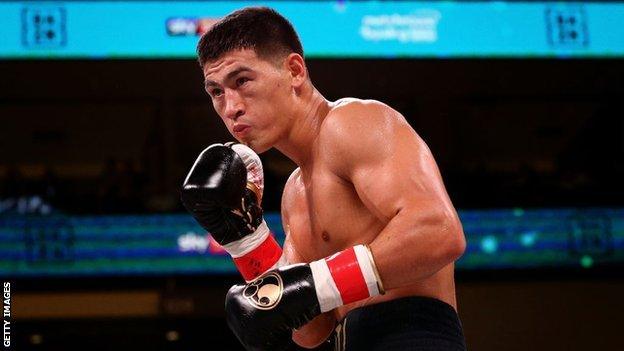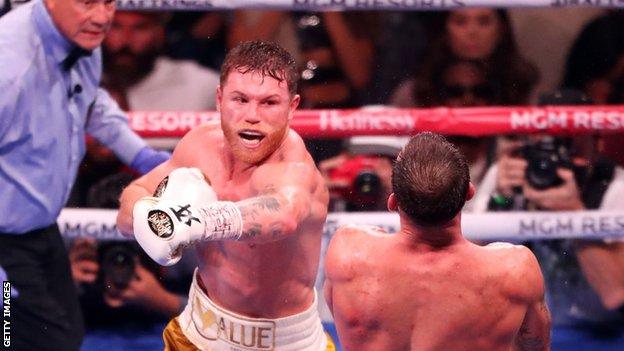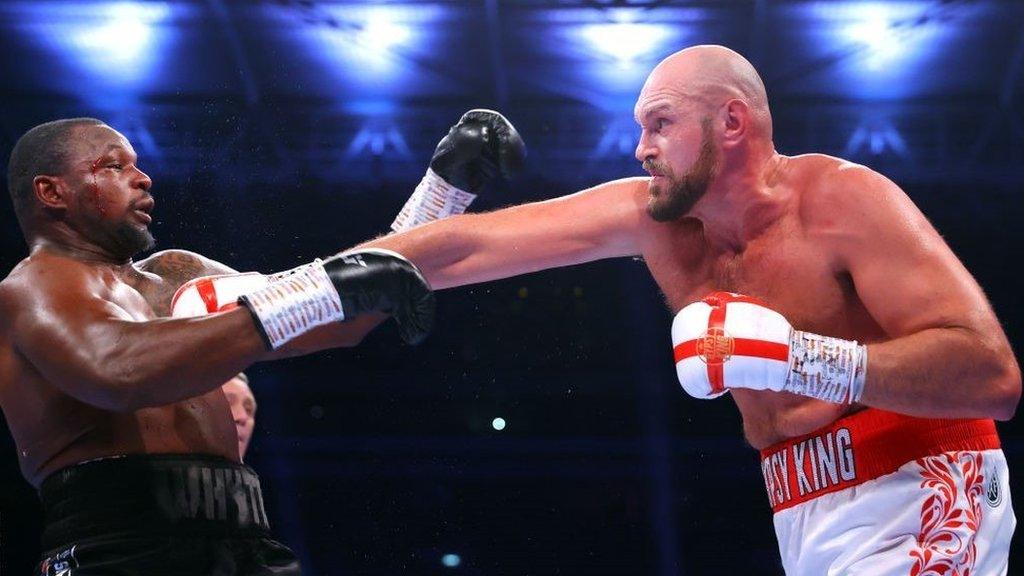Saul 'Canelo' Alvarez v Dmitry Bivol: Should Russian be allowed to fight?
- Published

Bivol is unbeaten in 19 professional fights and has held the WBA light-heavyweight title since 2017
"This kid has got the opportunity of a lifetime, he's going to take advantage of it for himself regardless of whether there is a problem going on in his country."
Those are the words of Joel Diaz, the trainer of Russian Dmitry Bivol, who will defend his WBA light-heavyweight title against Mexican superstar Saul 'Canelo' Alvarez on 7 May in Las Vegas.
Some 6,000 miles east of Las Vegas, the Mayor of Kyiv Vitali Klitschko and brother Wladimir continue to defend the Ukrainian capital from his country's military invasion.
The Klitschkos, former heavyweight champions, sent a clarion call to world sport in March: ban all Russian athletes from competition.
"Every Russian representative, in this case, needs to be sanctioned, because this way we show Russia that the world is against this senseless war," Wladimir told BBC Radio 5 Live.
Wladimir, who reigned as champion for almost a decade, then singled out the WBA showdown between undefeated Bivol and Mexican Alvarez for criticism.
He said: "It is important that this boxer [Bivol] is forbidden from fighting in America, just as all Russian athletes are being banned from international competition."
Boxing's world governing bodies - the WBC, WBO and IBF - responded to Russia's war in a joint statement that committed to blocking "championship fights involving boxers from Russia and Belarus". Belarus is a close ally of Russia.
The fourth governing body, the WBA, who will earn a substantial fee from authorising Bivol's defence of its light-heavyweight championship, stopped short of a similar penalty.
The WBA instead released a nine-point plan "in pursuit for peace" that ultimately gives Bivol his lucrative pay day but doesn't permit him to use Russian flags, the Russian national anthem, or speak out in favour of war.
But is the WBA correct to allow their champion, who has called for peace between Russia and Ukraine, to defend his title?
Bivol's US-based trainer Diaz empathises with the Klitschko brothers' position, but says his world champion pupil deserves his chance to make history.
"I understand that they [Ukraine] are going through some really tough moments and I don't blame them for saying that [Russian athletes should be banned]. Me as a human being, I understand the suffering families, there are a lot of problems in Ukraine.
"Bivol has nothing to do with politics, he has nothing to do with his country having a problem with another country, he's just doing what he's been doing all his life - getting ready to fight, being ready to perform. And being ready for the biggest opportunity of his lifetime.
"The only thing I can tell you is that it's not the athletes' fault. They're just working to feed their families. Boxers train to box. That's what they do. I just don't see that the athletes should be blamed for political problems. Getting sport involved with politics is a problem."
'He's just focusing on his sport, his family, his work'

Mexican Alvarez is a four-division world champion and one of the biggest draws in the sport
Sport and politics, however, have long converged.
Throughout history sport has transcended winning and losing trophies, medals and belts, at times becoming a force instead for political point-scoring and protest.
In the 1930s the Nazi party declared German heavyweight Max Schmelling's victory over American Joe Louis as evidence of white supremacy - Louis, incidentally, took one round to crush Schmeling, as well as this particular strain of Nazi propaganda, in the rematch two years later.
In 1968 US medallists Tommie Smith and John Carlos' raised fists helped to spread the message of black equality and civil rights during the Olympics in Mexico.
In 2016 NFL quarterback Colin Kaepernick, kneeling in protest at racist violence, created a global symbol for anti-racism - an example of the power sport has in bringing people together.
So if the champion Bivol - who was born in Kyrgyzstan but holds a Russian passport - creates a seismic shock and stuns undisputed world super-middleweight champion Alvarez, will it be a symbolic victory for Russia and its invading forces?
Diaz says the outcome of the contest will hold no wider meaning.
"At the end of the day, if he wins and beats Canelo, that win will be for him, his team and his family," he continued.
"By him winning and beating Canelo, is he supporting his country? I don't know. All I can tell you is this is the biggest fight of his life. He has the opportunity to make history by beating the best pound-for-pound fighter in the world right now.
"Obviously you represent your country every time you fight. But if Bivol is aware of what's happening and he agrees with the situation that Russia has, and he is supporting that, then obviously he's doing wrong. But he's not into any of that, he's just focusing on his sport, his family, his work.
"He has spent money on camp, on top sparring partners that cost $500 a day. They invest a lot of money in training, rent, food, vitamins - there's a lot of money already invested for someone just to say Russian athletes should be banned.
"If he lost the opportunity [against Alvarez], of course, economically, he'd lose the opportunity to bring home a good pay day. It affects him, it affects his family. Who knows, due to the fact that there's a problem in his country he may not get the opportunity again. Canelo may say, you know what, I don't want to fight him any more.
"It's a double-edged sword with whatever I say. People can take it in a bad way because they're from there [Ukraine]. But there are other people that will say coach Diaz is right."

Could an afternoon nap boost your memory?: Dr Michael Mosley looks at the benefits of a siesta
Did fame contribute to their deaths?: Legends Never Die explores what happened to three Gen Z hip-hop stars

Related topics
- Published16 October 2022
